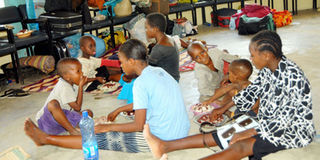Leaders link multinationals eyeing land in region to bloodletting

PHOTO | GIDEON MAUNDU Displaced residents of Kibusu Village camping at Maridhiano Hall share a meal. The families were uprooted from their homes by suspected Orma raiders.
What you need to know:
- Firms seeking large parcels of land for farming accused of fuelling violence to displace the locals
The bloodletting in Tana Delta may be linked to scramble for fertile soils by multi-nationals besides animosity between local communities.
Local leaders and residents now blame the sporadic violence on external forces out to drive the communities out of the area and take their land. (Editorial: Take decisive action to end Tana deaths)
On Saturday, some leaders from Orma, Wardei and Pokomo communities alleged that the violence was not a fight between farmers and pastoralists.
Former Ambassador Hussein Dado said the attacks were the work of outsiders who did not mean well for the locals.
In the past, concerns have been raised over plans by the government to lease 40,000 hectares to Qatar to grow fruits and vegetables so that the Gulf State funds the Lamu port project.
Four years ago, Mumias Sugar was granted a licence to turn a wetland in the area into sugarcane plantations for production of sugar and eco-friendly biofuels.
Tana River County Chairman Gure Golo claims the investors who have expressed interests in sugarcane farming and horticultural projects are major players in the bloody conflict.
Mr Golo suspects some people interested in the land are using dirty tactics to fuel clashes and later occupy it with ease after people flee to other towns.
“If this is not the case, then why burn the villages and destroy property without making arrests?” he said on Sunday.
Besides these plans, the government has issued tenure rights and ownership of 40,000ha of Delta land to Tana River Development Authority (Tarda) to grow rice and maize.
A second sugar company, Mat International, has also expressed interest in the acquisition of over 30,000ha in Tana Delta and another 90,000ha in adjacent districts.
A Canadian-based Multinational, Bedford Biofuels Inc, is also seeking a 45-year lease agreement for 65,000 ha owned by five group ranches in Tana River District to grow Jatropha.
Tiomin Kenya Limited also harbours interests in the extraction of Titanium from the sand dunes of the delta.
Galile Chairman for Peace Roba Shambaro says once the land is lost, herders will find it difficult to graze their livestock on the unoccupied wetland.
The locals claim there is a perception among government officials that the fertile range land, wetland and flood plains are underutilised by the locals. “Because of this attitude, some forces within the government are now pushing for the investor’s interest because they believe with proper investment, the wetlands can generate billions,” said Mr Anwar Abae, a resident.
However, Tana Delta DC David Kiprop believes the investments plans by the government mean well to the locals. He says the allegations of under-hand dealings by the government to evict the Orma and Pokomo communities are mere speculations.
“We cannot push the locals. When investors come to put up investments, the government will engage the communities and stakeholders in dialogue,” he says.
The conflict has claimed over 200 lives and displaced over 35,000 others.
A judicial commission appointed to look into the clashes is expected to present its report to President Kibaki on Monday morning.




